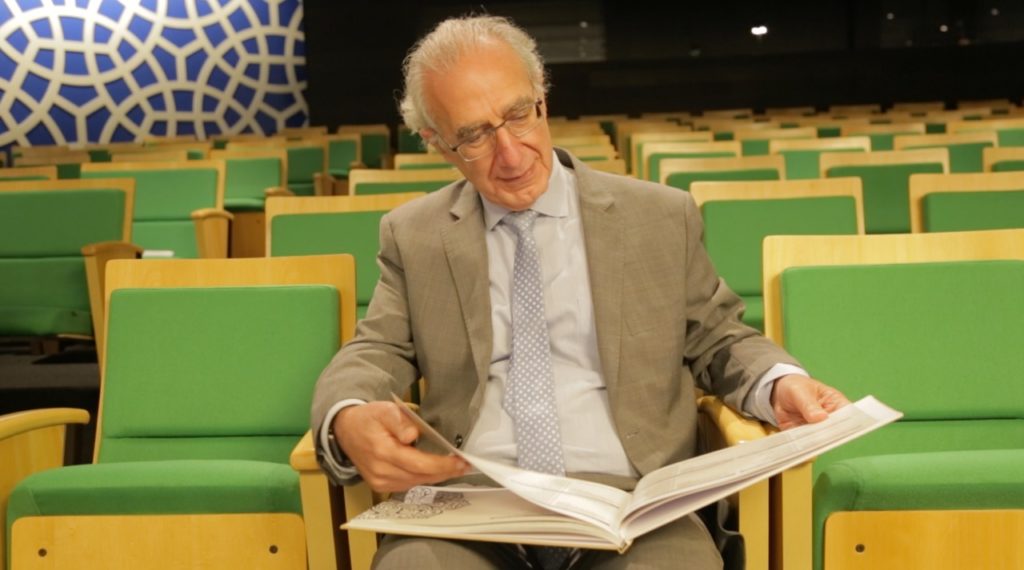São Paulo – Businessman Rubens Hannun’s four-year term as president of the Arab Brazilian Chamber of Commerce (ABCC) ended this Thursday (22). He passed on the presidency to diplomat Osmar Chohfi during a half-in-person, half-online ceremony. Pictured above, Hannun looks at a photo book of his term presented to him as a tribute by ABCC staff.
In his outgoing address, Hannun said he feels he has accomplished his mission and discussed the guidelines that underpinned his presidency and his board’s actions. He said the ABCC’s track record of nearly seventy years enabled the work that was done in the past few years.
Several challenges came up in Brazil’s relations with Arab countries since Hannun’s term began in 2017, including Operation Weak Flesh – which unveiled irregularities by Brazilian meat packers –, a shift in national politics, and the Covid-19 pandemic.
Operation Weak Flesh prompted the ABCC to create a crisis committee. The organization played an active role in normalizing Brazilian-Arab meat trade by relaying information and making business safe for both sides – Brazil supplies meat to Arab countries. “We had to decide very quickly which way to go: to remain passive and watch someone else make history, or to take action and help build that history,” said Hannun.
In every situation that came up, they ABCC worked to cater to the interests of Arabs as well as Brazilians. “We chose the hard route, the one we’d be held accountable for, the riskier path. But God helped us, and the unity of the board and the staff has been remarkable,” he said regarding the choice to take center stage and actively seek solutions.
The need for novel sources of revenue saw the ABCC – which had embarked on a process of accepting Brazilian enterprises to become members – also set out to gain recognition from markets. “We had to go faster and to work on that recognition,” he said. “The organization opened a branch office in Itajaí, Santa Catarina and an international office in Dubai, UAE. It also worked on getting Arab companies to join as members. Hannun said that during these four years, the ABCC also made changes to its structure and its organizational culture.
Here’s more on this topic:
Hannun said the hosting of the 1st Brazil & Arab Countries Economic Forum in 2018, which was attended by more than 100 Arab businesspeople, was important in getting Arabs to recognize their relevance to Brazil and vice versa. Hundreds of Brazilian entrepreneurs, ministers, and then-president Michel Temer attended the event. The 2nd Forum, in 2020, was held online due to the pandemic, and it even further cemented relations. Viewership exceeded 10,000.Looking back on his term, Hannun also discussed the ABCC’s growing rapport with the federal government and the fact that vice president Hamilton Mourão and minister of Agriculture, Livestock and Supply Tereza Cristina proved to be partners in fostering relations with Arab countries. President Jair Bolsonaro paid a visit to three Arab countries – Qatar, Saudi Arabia and the UAE – in November 2019. The ABCC joined along and reached a number of agreements while there.
More challenges
Covid-19 brought new challenges. During the meeting, ABCC secretary-general and CEO Tamer Mansour discussed some of the measures put in place to address the pandemic, including a committee established to meet Arab needs, especially regarding food, and to prevent product shortages. “We got more than 50 Brazilian organizations together,” said Mansour regarding the committee’s work.
Innovation has been rife at the ABCC, which shifted gears towards remote work and kept its certification service running without interruptions. It hosted more than 40 webinars, announced its Ellos digital platform for Arab-Brazilian relations, conducted a survey on the Arab community in Brazil, created the WAHI women’s committee, announced the advent of the Arab House, subscribed to the United Nations Global Compact, and rolled out social responsibility campaigns to support Brazilians through the pandemic and the Lebanese following the Port of Beirut blast, among many other things.
The survey on immigration, whose results were made public last year, is the subject of the book “Arab Presence in Brazil,” written by Walid Yazigi, who chaired the ABCC board. Rubens Hannun announced the book’s launch during Osmar Chohfi’s inauguration. Conducted by H2R Pesquisas Avançadas and Ibope Inteligência, the survey showed that there are 11.6 million Arabs and Arab descendants in Brazil.
Trade
The meeting also saw 2020 Brazilian-Arab trade numbers disclosed. ABCC treasurer Nahid Chicani said Arab countries were the third biggest destination for exports from Brazil last year, and second when it comes to agribusiness. Brazilian-Arab trade came out to USD 16.8 billion – USD 11.4 billion in exports from Brazil, and USD 5.3 billion in exports from Arab countries.
During the ceremony, Hannun was honored with a video featuring testimonials from ABCC staff regarding the last four years, and acknowledgements of his work, which moved him. Words like visionary, determined, creative, innovative and audacious, among many others, were used in describing the outgoing president. He was also given a book with pictures of his story in the ABCC.
Translated by Gabriel Pomerancblum




